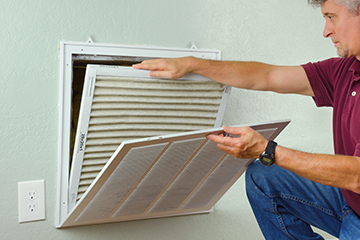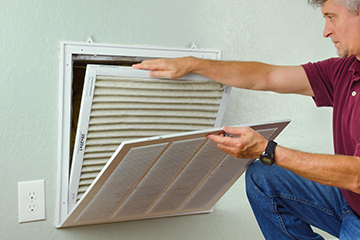

What you don’t know can, in fact, hurt you. In particular, if you are not taking an active role in ensuring that your HVAC system is regularly inspected and maintained, you might inadvertently be allowing a variety of health contaminants to swirl throughout the air in your home.
That being said, not everybody knows what to look for when they’re in the process of attending to their HVAC system or educating themselves on indoor air quality. Read the following to learn more about what common contaminants may be trapped in or perpetuated by your indoor air and heating system:
Mold and Fungus
According to the Indoor Air Quality Association, HVAC systems produce moisture and are “intrinsically dirty.” Thus, when improperly cared for, they can be natural breeding grounds for microbes and mold spores. Particularly if you have clogged condenser coils or drip pans that have not been cleaned for an extended period of time, your HVAC system is liable to generate and retain moisture that can be ultimately detrimental to your home’s indoor air quality — hence why the Centers for Disease Control (CDC) recommends controlling humidity and increasing ventilation inside of your home. Otherwise, mold spores can increase the inhabitants’ allergic reactions, exacerbate other chronic pre-existing health conditions, and spread infection.
Dirt, Dust, and More
Non-biological contaminants, such as dirt, dust, and other fine particles, can not only circulate within an HVAC system but can also clog air filters and ducts, thus contributing to poor indoor air quality. For instance, according to the United States Environmental Protection Agency (EPA), “particles of dust, dirt, or other substances may be drawn into the building from outside and can also be produced by activities that occur in buildings, like sanding wood or drywall, printing, copying, operating equipment and smoking.” Once inside, these contaminants are most likely to cause mild irritation to the nose and throat, inducing coughing, sneezing, and allergy attacks.
Volatile Organic Compounds
Many household chemicals — such as paints, cleaners, air fresheners, and more — may actually break down into what are known as volatile organic compounds, or VOCs. In other words, when these chemicals are exposed to the air reach a high enough level, they may cause a variety of physical symptoms, like dizziness, nausea, headaches, and throat/eye irritation. This is why the EPA recommends either using these products outdoors or increasing your home’s indoor ventilation when they are in use; because, otherwise, these compounds can be circulated by your HVAC system and pose a danger to your overall health.
If you have further questions about how best to maintain and optimize your indoor air quality, contact Luce Air Quality today! With a team-oriented approach to a broad range of high quality environmental and industrial hygiene services, you can rest assured we will always provide you with solutions you can trust. Call us today at 904-803-1014!


